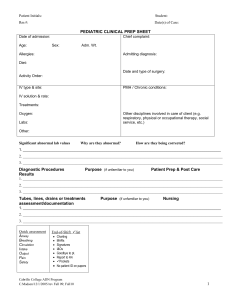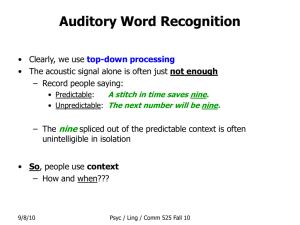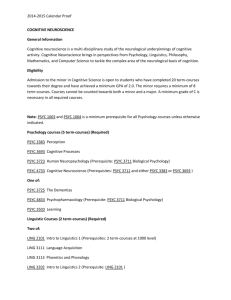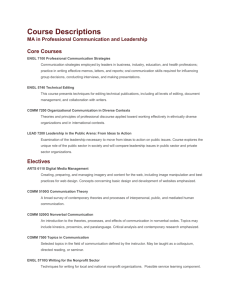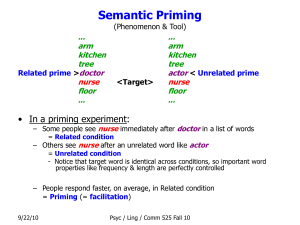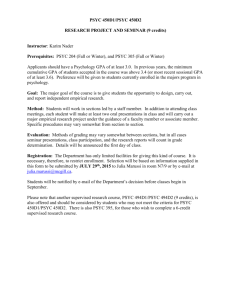Language Production Lecture 120110
advertisement
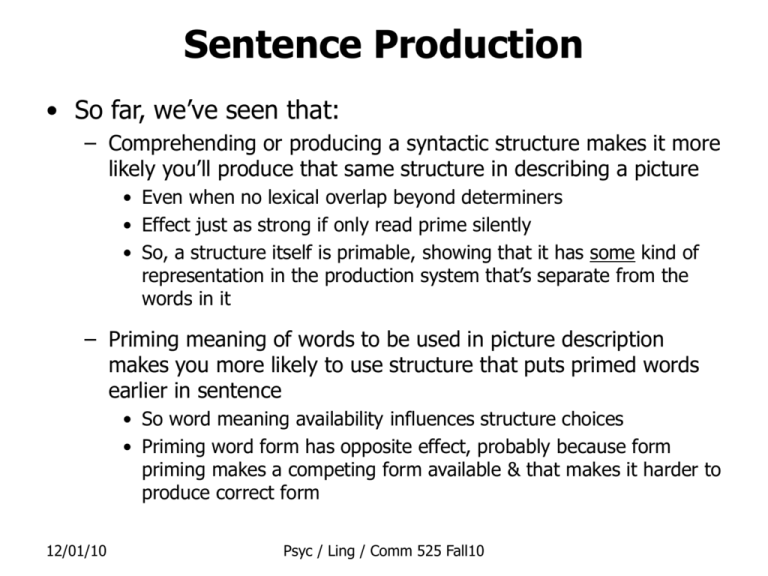
Sentence Production • So far, we’ve seen that: – Comprehending or producing a syntactic structure makes it more likely you’ll produce that same structure in describing a picture • Even when no lexical overlap beyond determiners • Effect just as strong if only read prime silently • So, a structure itself is primable, showing that it has some kind of representation in the production system that’s separate from the words in it – Priming meaning of words to be used in picture description makes you more likely to use structure that puts primed words earlier in sentence • So word meaning availability influences structure choices • Priming word form has opposite effect, probably because form priming makes a competing form available & that makes it harder to produce correct form 12/01/10 Psyc / Ling / Comm 525 Fall10 Subject-Verb Agreement in Sentence Production • When another noun comes between the Subject Noun & the Verb in English sentences – If number of Local Noun differs from that of Subject Noun – It sometimes leads to agreement errors called “attraction errors”’ – Most likely when Subject Noun singular & Local Noun plural • The only generalization I would dare to make about our customers are that they’re pierced. – Shows that production system sometimes loses track of subject while preparing and producing verb 12/01/10 Psyc / Ling / Comm 525 Fall10 • Bock & Cutting (1992) used plural attraction errors to investigate sentence production – If Local Noun intervening between Subject Noun & Verb is part of same clause as they are, will it be more “attractive” to Verb? The editor of the history books … vs The editor [who rejected the books] … 12/01/10 Psyc / Ling / Comm 525 Fall10 Results - Replicated earlier findings that plural Local Nouns much more attractive - And showed that’s especially true if it’s in same clause - Suggests clauses kept somewhat separate from one another in production (PP or RC) 12/01/10 Psyc / Ling / Comm 525 Fall10 Sound Errors in Words • Error outcomes are almost always “legal” for the language – e.g., English doesn’t have any words beginning with vl, & English – speakers never make slips like very flighty > vlery fighty • Furthermore, errors that result in saying real words are more likely than you’d expect by chance – barn door > darn bore is more likely than – dart board > bart doard 12/01/10 Psyc / Ling / Comm 525 Fall10 • What does “expect by chance” mean here? – For an error to result in saying wrong real words, there must be other words that are similar enough to the intended words – i.e., to provide the opportunity for a word outcome – e.g., barn door > darn bore – rotten cat > cotton rat • When you estimate how often such opportunities are likely to arise, – Given the vocabulary of the language – Errors that result in words happen more often than they should, if they were due purely to chance • = Lexical Bias – It’s not that word outcomes are overall more likely than non-word outcomes 12/01/10 Psyc / Ling / Comm 525 Fall10 Top-Down Processing Again • But maybe the lexical bias is on listener’s side??? – Maybe we tend to hear errors as words if at all possible, – Even when the speaker actually produced a non-word • Remember the phoneme-restoration effect? 12/01/10 Psyc / Ling / Comm 525 Fall10 A Technique for Inducing Sound Errors • Present a series of word pairs – – – – – ball doze bash door bean deck bell dark darn bore Interference Pairs – Read silently Target Pair – Say aloud fast • Can't predict when you'll have to say a pair aloud, so prepare on all trials • Possible responses: – – – – darn bore barn door barn bore darn door No error Exchange Anticipation Perseveration • Control the opportunities for word-producing errors – Record the responses & analyze them carefully – Exchanges on about 30% of the critical trials 12/01/10 Psyc / Ling / Comm 525 Fall10 Some Results • Exchanges resulting in word outcomes more likely ball doze bash door bean deck bell dog darn bore big dutch bang dark bill deal bark doll dart board – barn door More likely bart doard – – – – – Less likely • Confirms perceived pattern in spontaneous errors – Rules out Listener Bias as full explanation of Lexical Bias 12/01/10 Psyc / Ling / Comm 525 Fall10 Word Production Models • All current theories of word production: – Explain why errors are usually similar in either sound or meaning to the intended target – Have 2 stages 1. Retrieve lemma 2. Retrieve its sounds • But they differ in: – How separate & independent the 2 stages are – Their mechanism for producing similarity effects • Garrett's model vs Dell's model = Modularity vs Interaction again! 12/01/10 Psyc / Ling / Comm 525 Fall10 Garrett’s Model of Word Production • Lexicon organized into 2 “files” – Meaning File • Contains lemmas + pointers to locations in Sound File • Organized by meaning – Sound File • Contains word pronunciations • Organized by sound 12/01/10 Psyc / Ling / Comm 525 Fall10 • To say a word in Garrett’s model: – Intended meaning – Look in Meaning File and find lemma CAT – Use CAT's pointer to find its pronunciation /kaet/ in Sound File • Once you go into Sound File, you’re done selecting which word to say (i.e., which lemma to choose) – So what you find in Sound File cannot affect lemma choice 12/01/10 Psyc / Ling / Comm 525 Fall10 • In Garrett’s model: – Whole-word errors come from over- or undershoot in Meaning File • In right neighborhood, so find something similar in meaning – Sound errors come from over- or under-shoot in Sound File • In right neighborhood, so error should sound similar /kaeb/ • Garrett’s model was intentionally built with independent meaning & sound stages – Specifically to explain why errors seem to be related in one or the other way but not both 12/01/10 Psyc / Ling / Comm 525 Fall10 Mixed Errors = Errors that are similar in both meaning and sound to intended word – CAT > rat – ORCHESTRA > sympathy • In Garrett’s model, there’s no way for both factors to interact in causing the error – Something that looks like a Mixed Error is really just meaningrelated error or just sound-related & it’s a coincidence that it’s similar in the other way, too ( CAT > rat ) – Or there were 2 independent errors, 1 at each stage • ORCHESTRA > SYMPHONY • SYMPHONY > sympathy • Mixed Errors rare because coincidences & double errors are rare 12/01/10 Psyc / Ling / Comm 525 Fall10 • Dell disagrees: – English vocabulary provides very few opportunities for Mixed Errors – Pairs of words that are similar in both sound and meaning like cat & rat or orchestra & sympathy are very rare • When you take that into account, Mixed Errors – Happen more often than you would expect by chance • Dell’s model was built to explain why errors tend to be related in – Either sound or meaning or both 12/01/10 Psyc / Ling / Comm 525 Fall10 Localist ^ 12/01/10 Psyc / Ling / Comm 525 Fall10 12/01/10 Psyc / Ling / Comm 525 Fall10 12/01/10 Psyc / Ling / Comm 525 Fall10 12/01/10 Psyc / Ling / Comm 525 Fall10 12/01/10 Psyc / Ling / Comm 525 Fall10 12/01/10 Psyc / Ling / Comm 525 Fall10 12/01/10 Psyc / Ling / Comm 525 Fall10 12/01/10 Psyc / Ling / Comm 525 Fall10 12/01/10 Psyc / Ling / Comm 525 Fall10 12/01/10 Psyc / Ling / Comm 525 Fall10 Garrett vs Dell • Meaning- or Sound-related errors: – Both models explain these • Mixed errors: – Garrett's model explains why these are unlikely – While Dell's model explains why they're especially likely – They disagree about the data • Legal outcome bias: – Requires an extra process in Garrett's model • • • • Pre-articulatory Editor (usually unconscious) Very likely to notice & prevent illegal sound combinations Fairly likely to notice & prevent non-words Less likely to notice an unintended word – Natural consequence of architecture of Dell's model 12/01/10 Psyc / Ling / Comm 525 Fall10 Evidence for an Editor • Motley, Camden, & Baars (1982) – – – – shot home shame hear show hand hit shed • People less likely to make errors resulting in taboo words • Said unaware of possibility of saying taboo word – But increased Galvanic Skin Response (GSR) on trials where there was an opportunity to say a taboo word 12/01/10 Psyc / Ling / Comm 525 Fall10 12/01/10 Psyc / Ling / Comm 525 Fall10 An Example of Testing Dell’s Model • Lexical Bias caused by activation reverberating back & forth – Takes time • Prediction: – Errors should be less likely to be words as people talk faster – Would be virtually impossible to observe with spontaneous errors – The prediction is confirmed when errors are elicited in the lab • So, testing the model’s predictions led to the discovery of a new fact about speech errors • Model implemented as computer program (= simulation) that “talks” – Predictions derived from model – Tested in studies with people 12/01/10 Psyc / Ling / Comm 525 Fall10

